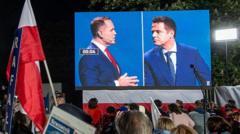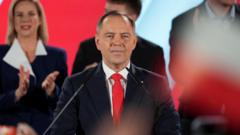As Poland gears up for a crucial presidential election, two candidates—Rafal Trzaskowski, the liberal mayor of Warsaw, and Karol Nawrocki, a national-conservative historian—stand poised for a likely runoff match. This election serves as a significant crossroads for the nation, as existing political power dynamics could shift from the longstanding domination of two major parties. Despite the polarized political climate, many voters express disenchantment with the two-party system.
**Poland's Presidential Election: A Battle Between Tradition and Change**

**Poland's Presidential Election: A Battle Between Tradition and Change**
Polish voters face a pivotal election as they head to the polls on Sunday, with Rafal Trzaskowski and Karol Nawrocki emerging as key contenders.
With a tight race anticipated, Trzaskowski, representing the Civic Platform (PO), currently leads the polls. His challenger, Nawrocki, supported by the Law and Justice (PiS) party, is trailing by a margin of 4%-6%. The implications of this election resonate deeply, as the president holds veto power over government legislation—a crucial check against the current coalition led by Prime Minister Donald Tusk, who came to power after a period of PiS's right-wing rule.
Although Tusk has been regarded as a savior of liberal democracy, he faces criticism for failing to uphold some campaign promises, particularly regarding immigration and women's rights. Observers indicate that the potential presidential election outcomes highlight a dichotomy: a choice between authoritarian populism and what some perceive as hypocritical liberal governance.
As the debate heats up, issues surrounding migration, LGBTQ+ rights, and an increasingly conservative climate dominate the conversation, leaving many voters expressing weariness with traditional political choices. Meanwhile, allegations swirling around Nawrocki's real estate dealings do not appear to have adversely affected his support to date.
With significant public fatigue toward the established parties evident, numerous Poles are looking to break away from political conventions. As voter sentiment swells against the backdrop of governmental performance and national integrity, this election may ultimately redefine Poland's political landscape.
---
As Poles prepare for a tightly contested presidential election, the clear divide between traditional values and modern liberalism fuels speculation about the political future. Analysts and media continue to dissect the ramifications of this election, echoing the voters’ calls for change and transparency amid the entrenched political system.
Although Tusk has been regarded as a savior of liberal democracy, he faces criticism for failing to uphold some campaign promises, particularly regarding immigration and women's rights. Observers indicate that the potential presidential election outcomes highlight a dichotomy: a choice between authoritarian populism and what some perceive as hypocritical liberal governance.
As the debate heats up, issues surrounding migration, LGBTQ+ rights, and an increasingly conservative climate dominate the conversation, leaving many voters expressing weariness with traditional political choices. Meanwhile, allegations swirling around Nawrocki's real estate dealings do not appear to have adversely affected his support to date.
With significant public fatigue toward the established parties evident, numerous Poles are looking to break away from political conventions. As voter sentiment swells against the backdrop of governmental performance and national integrity, this election may ultimately redefine Poland's political landscape.
---
As Poles prepare for a tightly contested presidential election, the clear divide between traditional values and modern liberalism fuels speculation about the political future. Analysts and media continue to dissect the ramifications of this election, echoing the voters’ calls for change and transparency amid the entrenched political system.





















